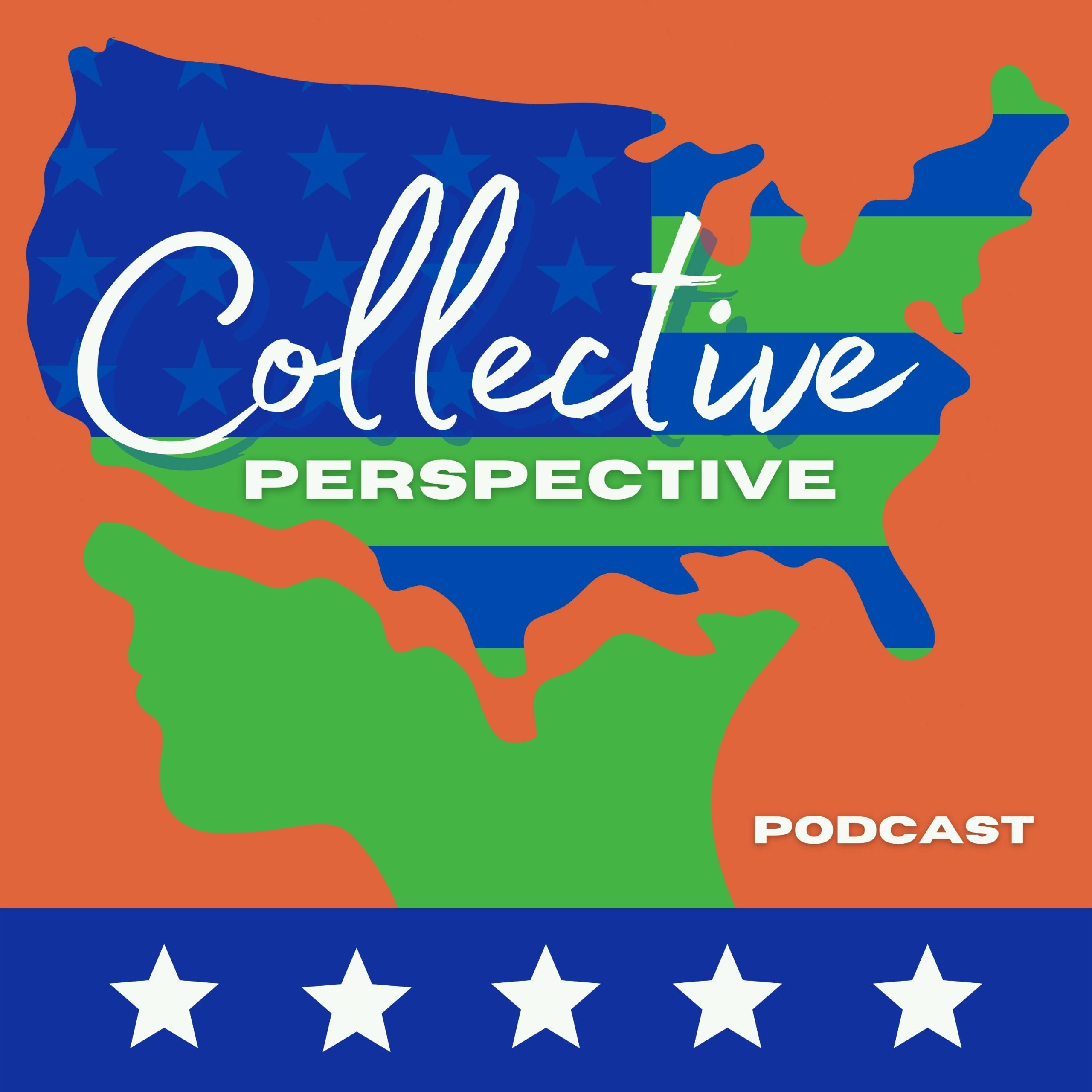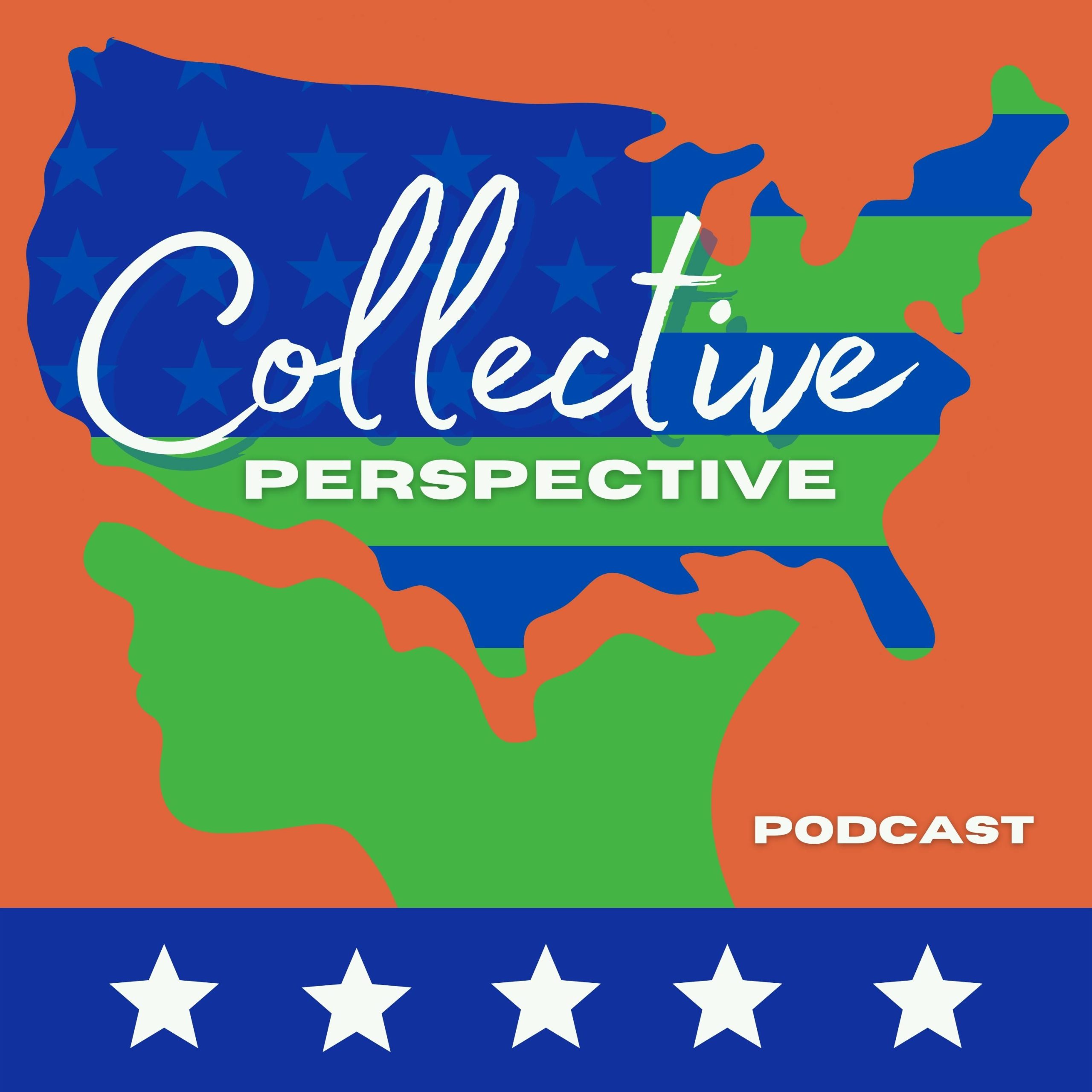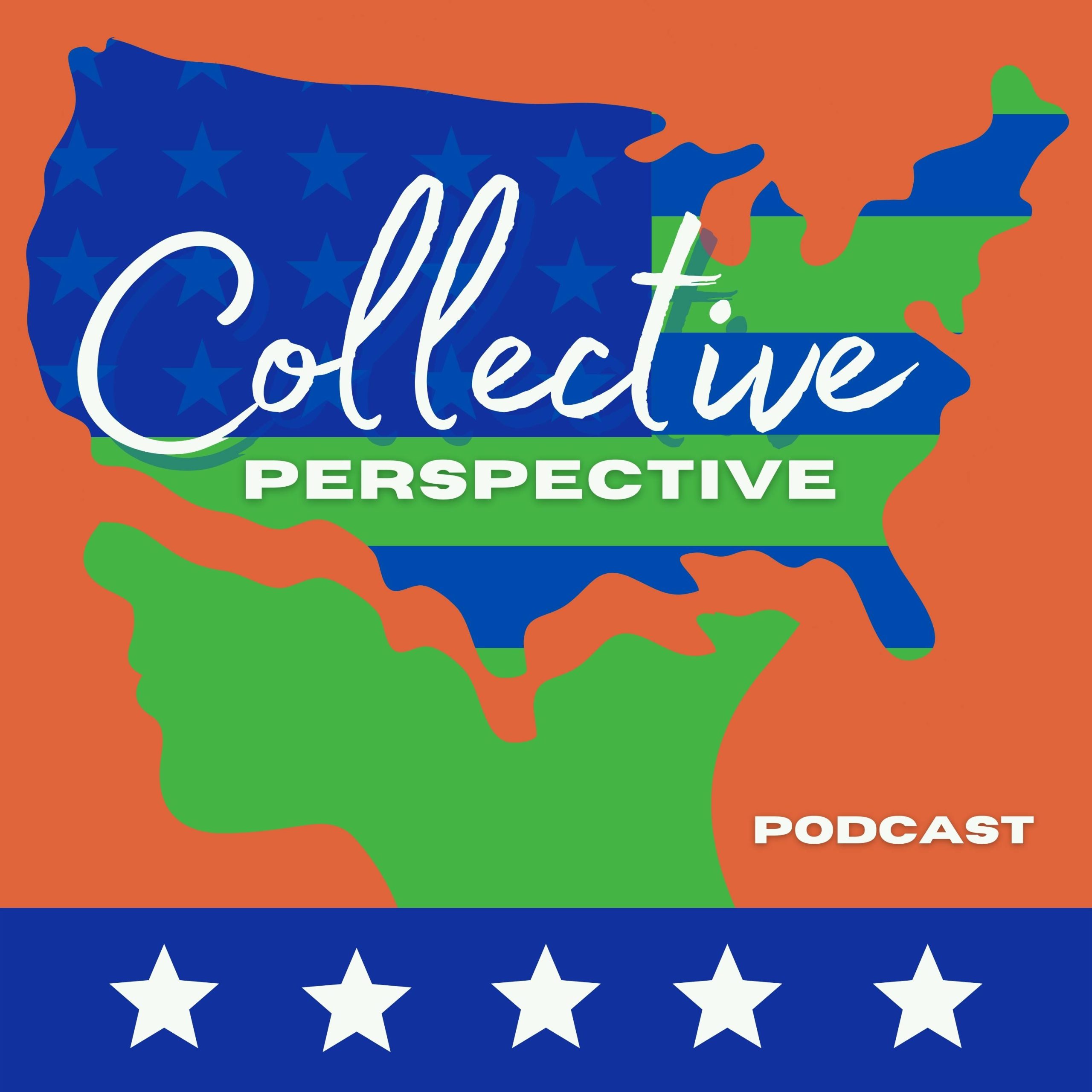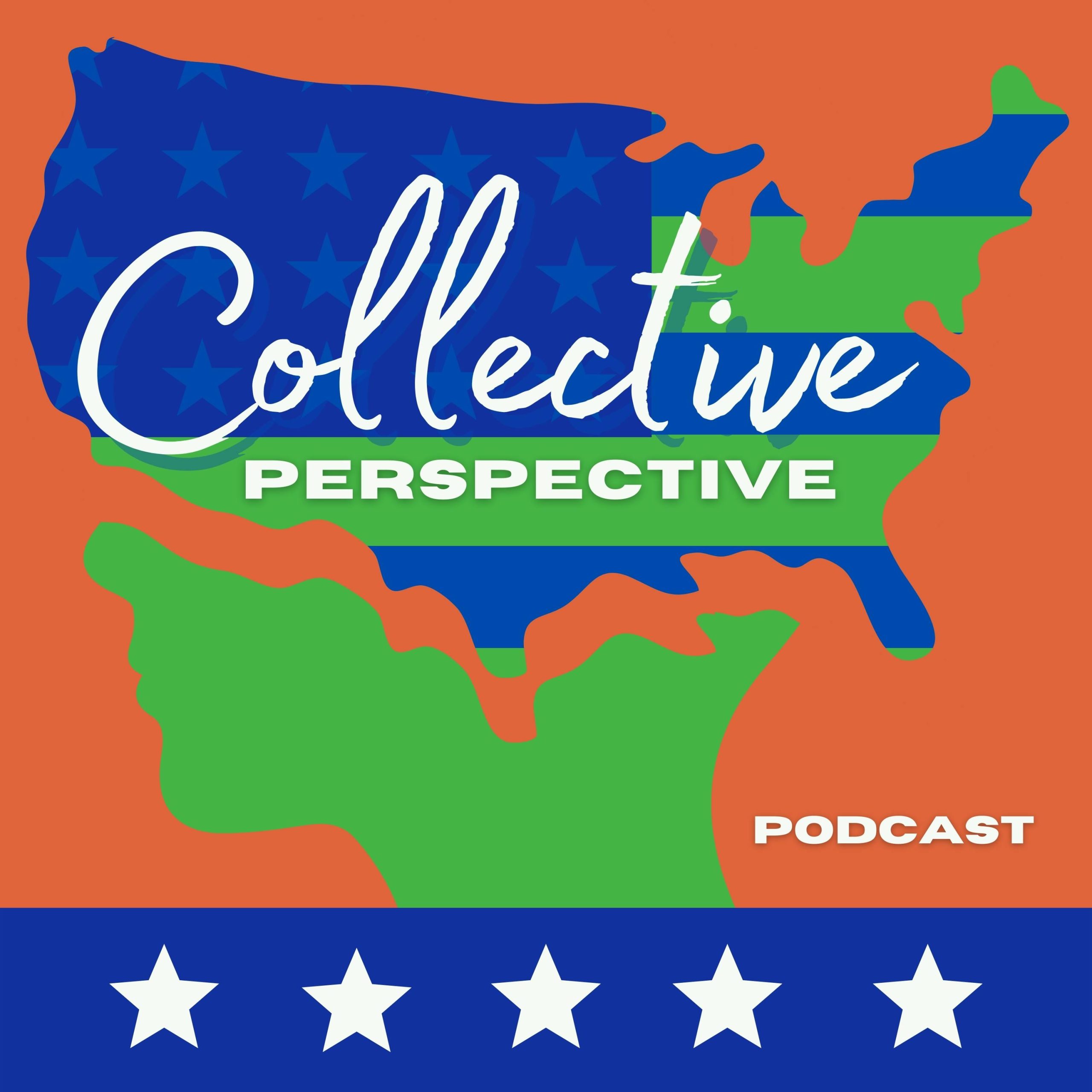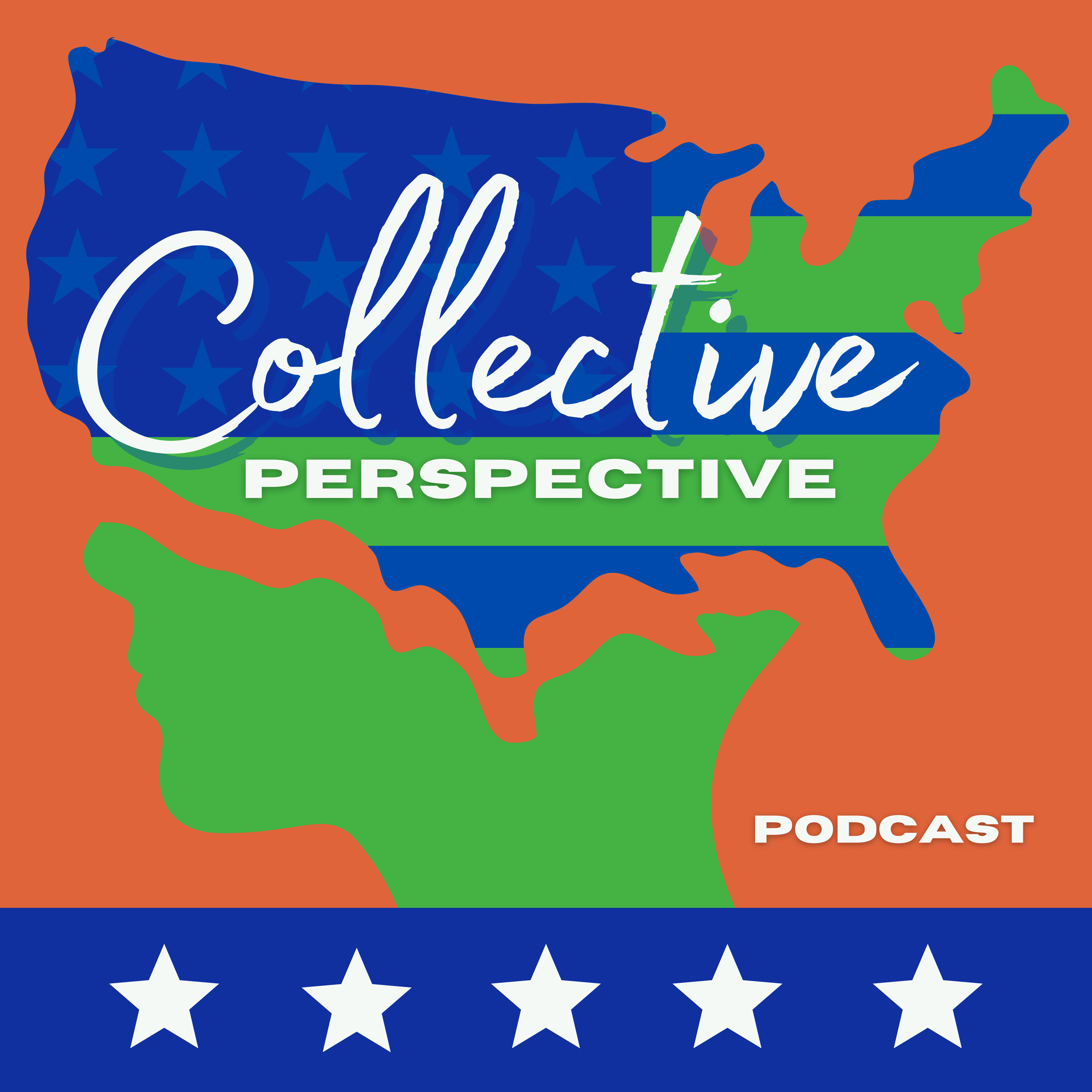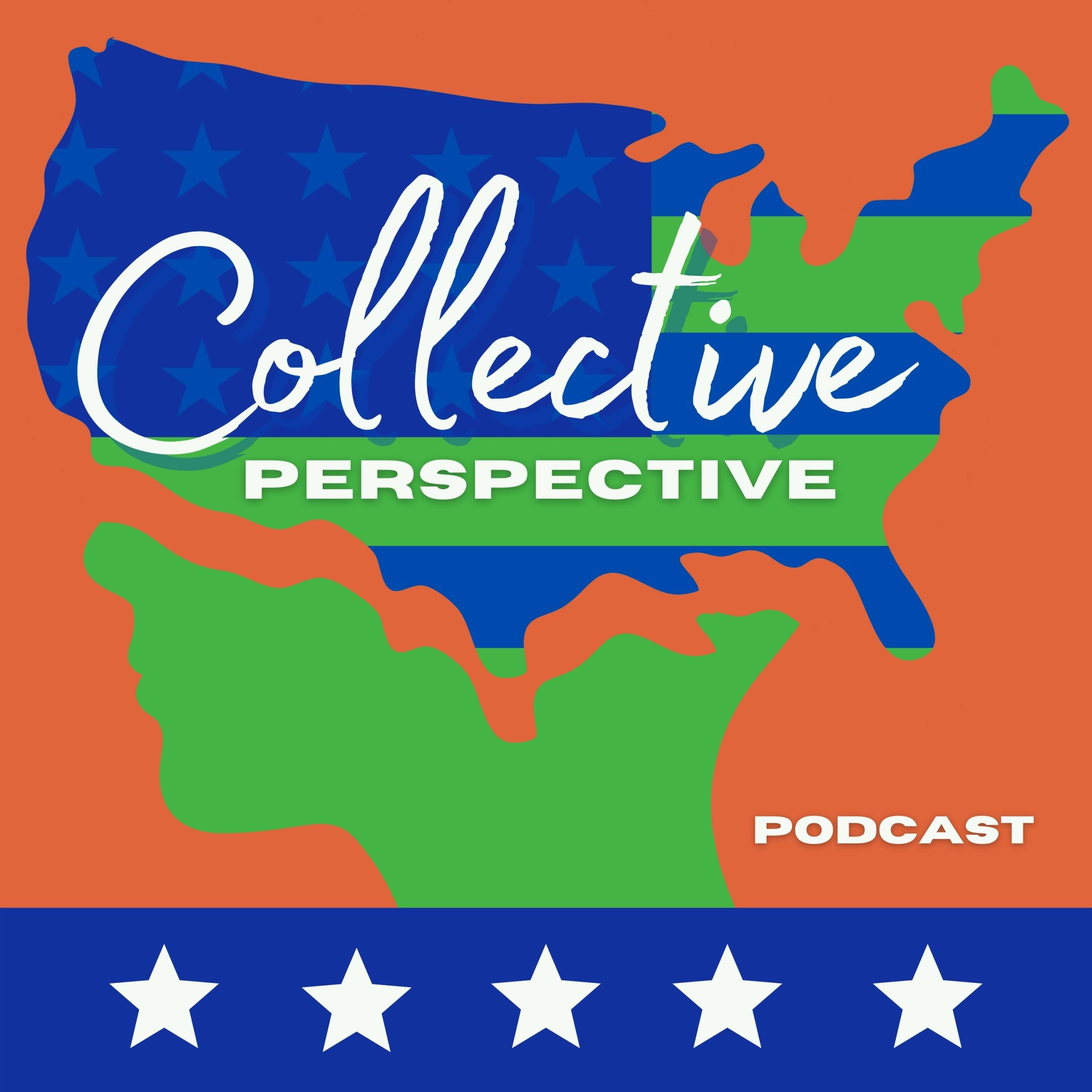Can you imagine a day when everything you hear on a news report is unbiased, without a personal, political or business agenda? The good news is there are still good people in the world. There are still people that are born to be American heroes. It’s time to wake up from the American dream and live it! This episode explores what is propaganda and how it’s ingrained into society throughout US history and the several forms of media. We thank Jamey for his perspective. This episode is part 1 of 2.
View Full Transcript
Episode Transcript
The Collective Perspective is set out on a mission to understand some of the most impactful and controversial trends and topics in our lives today. Hi, I'm Jeff. Hi, I'm Travis. Hi, I'm Jawad. Can we find common ground in the middle, in a peaceful manner, but with real community benefit? We believe as veterans and concerned citizens, we are striving to bring together diverse views.
With fact based research to navigate this tough terrain in a search of a viable path forward. How do we unify as Americans and prove we aren't all that much different? So meet us in the middle, not the left or the right. In season two, we have decided to focus on researching and exposing fake news and fake information.
We're tired of the media lying to us. We're tired of the fake news. Tired of the government lying to us. And our mission is to seek the truth. Everybody. This is the collective perspective podcast, and we're here in sunny Jacksonville, Florida, talking to you from Daikon recording studio.
Hey everybody. This is a collector perspective. This is Jeff and this is Travis. And we have our buddy again. Good to see you guys again, Mr. Mills. Awesome. Nice to see you. Hey deez, today's topic is about the media. The media is a really big topic. First we wanted to start out with the history of media in the United States and just follow the journey with us.
The history of the United States, U. S. media has gone a long way. We've gone from a newspaper. On the side of the road, you can kind of picture it at the old days where like newspaper, newspaper, and everybody that comes by that corner, pays the kid, takes the newspaper. And that was really their only source of news, except for maybe the five people that they talk to on a daily basis.
And this is going all the way back to 1690. Then within 50 years, the magazine came into many big U. S. cities. Of course, journalism was the main source. One of the first magazines would be the Farmer's Almanac. Ben Franklin was part of that. Then there were the It was one of the first in circulation. I don't know if you can call the Federalist Papers something like that as well.
Was that, I don't know if that was a magazine or if that was a column in one of the newspapers. I thought it was like club orientated, that. It was like a newsletter in clubs, like a, like Secret Society or whatever, you know, bones and skull and bone kind of thing. I don't know that they were more, that that was very secretive.
I think that was out in the open, but they did use a pen name. I think that was, uh, was that Thomas Jefferson or one of the founding fathers was… No, it was Ben, Ben Franklin. What's the pen name? He used a pen name. No, I'm talking about for the Federalist Papers, they, I thought he used a pen name for that too.
That would be like Jefferson, I think. Okay, probably. There's a timeline for the evolution of mass media in the United States. It started out with the pre industrial age, which was the 1600s, just newspapers. Industrial age, 1700 to 1930, really big boom in newspapers and magazine production. The electronic age, radio and television, the evolution of new media, the 21st century, where we've been at since about, let's say 1996, where the internet kind of changed everything.
What is the role of media in democracy in the USA? Normative roles of media in the democracy have really changed a lot and have gotten, they're able to be spread more openly and widely across vast populations these days. Media provides information to individuals to make their own decisions. The monitorial role involves practices such as publishing reports, agendas, And threats reporting political, social and economic decisions and shedding light to the public opinion, but it's not right.
I think there's a little bit too much editorial editorial. Yes, I agree with a little tutorial to Just throw in two tutorials or Orioles. I'm more of a Marlins fan Really? Yeah, the the role of the median democracy in an ideal world or what? I would like to see it is where everything is just bland. Here's the information All of it and let's have you decide instead of somebody, what did they say that if there's more than two people on the screen, it's an editorial given that we talked about that on the last episode, but I think that that's more of an opinion piece at that point, how many true.
News journalists, can you recall, or do you remember, I can only think of maybe four, maybe five tops since the 70s, maybe 60s. Now we're gonna get into the multiple different facets of the media. We all agree that the media revolves around one particular term, and that's propaganda. Whether good or bad.
Truthful or deceitful, I guess, uh, would be a better way to say that. Yeah, I'm, I'm listening to you. You said you want media to be bland and just, okay, here's the facts. You guys kind of use your imagination to ingest this information. Well, think about it. There's different types of media. There's music where you can be creative, and it doesn't really have to be the truth.
There's fiction and non fiction. But I mean, the general public wants you to, they want you to tell them how to think. I'm wondering where we should go with that as far as, are you talking media in general? Or just more specifically, news media? Because that's where I was heading with that. Yeah, because that's a broad stroke.
Media. I think with news media, we had some Well, we're talking about media. It doesn't matter what. What type system that you get on the Internet? It could be Disney with their movie that you watch propaganda. That was not really news. It was just media putting out a message. Well, if you're gonna get into war propaganda, that's that's a whole big time.
I wasn't meaning to go that way. I was just pointing out that for media. I know news news is one thing, and I think that that's where we are. Focus might be more of this on this episode is towards the news, not necessarily Encompassing all media, but we're touching on all media because it is all relevant to what we're discussing right now.
I would say that again, whatever platform it's probably, uh, video and audio related, meaning TV commercials or videos that you may find radio, radio advertisements and stuff like that. Going back to what we just said about what monitorial role? The monitorial role involves practices such as. Publishing reports.
Maybe I'm not understanding that word monitorial. Monitorial to me would be more of kind of the monitorial role involves practices such as publishing reports. It has to be someone monitoring it to say, Hey, there's a change here. Or, Hey, this is something that we need to talk about. So somebody has to be the hunter or the gatherer, the hunter and the gatherer.
Media that will go out and investigative reporting and fine news. And then there's those that collect it. I would think that they would have to organize it by By those said things, publishing reports, agendas, threats. Reporting political, social, and economic decisions, and Alright, how about this? Shedding light on public opinion.
How about this? From Encyclopedia Britannica. Monitorial system, also called Lancastarian system. Teaching method, is what it is. Practice most extensively in the 19th century, in which the older or better scholars taught the younger or weaker pupils. In the system as promoted by the English educator Joseph Lancaster, the superior students learned their lessons from the adult teacher in charge of the school.
and then transmitted their knowledge to the inferior students. You're seeing as media, as that monitorial type of system, the better. I think that that could be part of the problem with a lot of the media is the ones that are getting their voices heard are put up on a pedestal already and they think they're better than everyone else and their word is the truth.
That depends on who, who matters to them most. That leads to, is there a difference between propaganda or alternative facts and lies? Let's, let's listen to a friend of ours, what he thinks about that. It's a very interesting topic and I think it's a lot of confusion around it. Propaganda was originally a Latin term, as I understand it, that means to spread or propagate and was widely used in the 15th, 17th century.
Catholic church, as they were trying to expand the church's influence through propaganda, spreading the word. Now, propaganda is a much bigger, broader concept that is more, is, is the story that's being told. I think that. The parts of it are alternative facts, which to me are, are, is not the truth. That'd be like saying if, if a basketball team lost a game a hundred to nothing, your alternative facts would be the losing team put on a valiant effort and were just in the game the whole time.
That's alternative facts. An outright lie is just, you know, no truth, fact, obligation, or, or anything backing it up. Also can be, uh, hyperbole, which is, you know, uh, uh, exaggeration of the truth. Propaganda is the bigger, broader story. Alternative facts are… Not the facts on the ground, the real story and outright lies or fabrications or deceit help spread the propaganda that you're on a mission to share.
I liked his description of alternative facts. With the basketball team losing 100 to nothing, instead of saying they were in it the whole time, they put on a valiant effort. 100 to nothing doesn't sound like a valiant effort. Maybe 90 to 100 would be a valiant effort. I mean, to me, it seems like if you categorize what you're doing as propaganda, or let's put it this way, if what you're doing isn't 100 percent truthful, then it's propaganda, and it's a lie, to some degree.
It just depends on what topic we're talking about, though. I think that's the crux of a lot of it, is what is the topic and what is it that you need to make your opinion? Or your, you know, what is it that you need to make your opinion? Like, most of us, I would dare say, everybody in the world tells at least one lie a day.
At least one. But what is the purpose of that lie? Someone says, Hey, how are you? Oh, I'm fine. I'm not really fine, but I'm not going to burden you with my troubles today. So for what you need to know, I'm okay. Is that bad or is that just trying to protect someone else from your struggles? And when you talk about Propaganda, propaganda is still that to me, when I hear propaganda, there is a hidden agenda or a narrative that is being kind of pressed into the people through in some, to some degree, brainwash, it's like constant.
from bombarding them with information to push an agenda. Right. I think propaganda does tend to have a negative context to it. When we hear it these days, it's always in a negative form. Any deception or lies, I can't tell you, I can't sit here and convince you that I'm telling you the truth when there's, there's, there's some aspect of a lie.
In my message to you, and I think that in itself is, is harmful. I think everyone has a right to the truth. I think the bottom line is this propaganda is a type of persuasion. It is short circuits, the brain by manipulating its audience with false information. linked to emotional appeals. False information can have an enormous emotional appeal Emotional appeals.
There there that is again. if it confirms our biases, making us want to embrace rather than evaluate its truthfulness. You can recognize propaganda in politics and advertising by learning the various Propaganda techniques. Check out this jaw dropping video of a historical political campaign. From the Library of Congress in Washington, D.
C.
10, 9, 8, 7, 5, 4, 3, 2, 1.
These are the stakes to make a world in which all of God's children can live are to go into the dark. We must either love each other or we must die. Vote for President Johnson on November 3rd. The stakes are too high for you to stay home. This has been a presentation of the Library of Congress. Visit us at LOC.
gov. That's a government source. Maybe, that's, that's crazy. That's some disturbing stuff, right? Wow. That was a textual campaign commercial? That's wild, bro. But that's propaganda. That is a perfect example of propaganda. Did you know that propaganda, I mean, propaganda goes… Historically throughout humankind, it goes back to ancient Greece, probably before that, probably even before that.
But if we fast forward to propaganda in the United States, and we're talking revolutionary war, propaganda was used to rally American colonists to the Patriot cause leaders such as Benjamin Franklin convinced that the 13 colonies needed to unite as one nation as they hoped to stand against. The British Empire.
There was something interesting too, Paul Revere was a major author of colonial propaganda. He skewed depiction of a group of British soldiers firing into an unarmed crowd. It was only like four or five people that died in it. It wasn't as many as people think it was. When you hear the Boston Massacre, you think that 20, 30, 40 people died in it.
Yeah, like a lot of people. It was only a handful of people, and I think it still, on today's standards, it would Count as a mass shooting or a mass killing if you will it was not Like a genocide type thing like Mao or Hitler or any of the Stalinist dictators Oh my god, that was the other one. I was forgetting.
Yeah. Oh my god. So fast forwarding to the 19th century World War I and II, the U. S. government used propaganda such as, have you ever heard of Rosie the Riveter? Have you? Yes. Well, I'm Navy, and there were signs almost in every one of our, at least some of the offices, platoons, if you will, or quadrants. More, more so the squadrons or some of your ship based commands and the commands you would see posters everywhere and Rosie the Riveter was one of the posters, the Uncle Sam picture.
I want you though. Those are so I never knew her name. But now when you say it, I got the, it's got the muscle and the red bandana, red bandana. Do you know what her purpose was? Um, her purpose was to represent the American woman that worked in the machinery factories that created weapons for world war one.
Because the men were fighting the war. The women were back home working in the industrial, uh, settings and they were, it was, it was a way to get them. It was a sign to, Hey, you're motivated. You're a strong woman. Come support the country this way, this is how you do it, while your man's out in war. Yeah. Wow.
I never knew her name, but now that you, you, it's literally an iconic picture. Rosie the Riveter so that was World War II. Yeah. If we go back to even further of the history of propaganda, the father, the father, the father, the father, the father of the, I don't even know what accent that was, we could do it.
The father of, gosh, dude. You sounding like you're trying to be Irish, the father. Yep. That's it. Yep, that's her. Wow. So someone else to go along with her is Uncle Sam, and that's why I wanted to bring this gentleman's name up. The father of Modern Propaganda, the United States. The founder of public relations, which, by the way, Travis or, uh, do you know what public relations from my perspective?
I always thought public relations was the office or the group within a company that put a positive spin on the company as opposed to human relations. More public relations was how. They help develop a way to, yes, to influence how the public views that company. I called up social firemen. They put out fires.
They manage social uprisings. They manage, they literally manage, like, literally pull out fires and, and, you know, kind of, Smooth over bad press your bad press man that if you notice that the guy does the PR when the celebrity or the politician looks bad, but when everything's great, then he shows up and he's like, Okay, I did it.
Yeah, same thing. I mean, they have a wait. What did the company do bad though? Why are companies doing bad things? How come Monsanto isn't out of business yet? And that's relevant, I think, to this, that a lot of what Monsanto did was they, I think they hid. Or they did not publish, uh, well, obviously you wouldn't want to publicize something negative about yourself and that's understandable when a lot of people are getting cancer from your products, that's where their PR person would step in and say, Hey, we did this and look at what we do for the.
So not getting too far off the topic, Edward Bernays was, interestingly enough, he is the nephew of Zygmunt Freud before he left Austria. He's from Austria, just like Zygmunt Freud is, and he moved to United States. Here's something that I got off of Britannica because I thought Bernays is pretty relevant figure in what we're talking about and how, How, what he did was looked as genius.
He was able to popularize cigarettes for women, which is, he did it in an interesting way. Lucky Strike approached him and said, we'd like to get more business and introduce cigarettes to women. At the time, Lucky Strike was a green pack of cigarettes and they're like, well, the color is not really appealing to women to buy this.
And Bernays took that color and did a fashion show. All in that same color green for women and had clothing companies design clothes and stuff like that. To match the color and then started doing advertisements print with that color Popularized the color and then boom it took off. Bernays thesis is that Invisible people who create knowledge and propaganda rule over the masses with a monopoly of power to shape thoughts values and citizens response engineering consent of the masses would be vital For the survival of democracy a seminal and controversial.
Do you know what a seminal is? Seminal? It has two meanings Seminal is the original Hold on The groundbreaking Study on something seminal is like the authority the first one of it. Okay, but I was asking Siri Did I explain it right? I don't know. Well, there was another definition of it though Well, there are the seminal vesicles in the gonads, right?
It also means sperm That's one point. I think you did. So I got both of them. If you have both your testicles. Are you missing one? No. So, a seminal and controversial figure in history. So he, he seeded everything. Who's that? Bernays? Bernays. In history of political thought and public relations, Edward Bernays.
Edward Bernays pioneered the scientific technique of shaping and manipulating a public opinion. When he famously dubbed Engineering of Consent, World War I, he was actually the creator of Uncle Sam. Uncle Sam wants you, Jawad. I don't know if you ever watch, even back, I don't know how old you are, and watch old Bob Hope movies and stuff, and the amount of propaganda and wartime stuff that it just kind of carried on.
And it was the propaganda and war. So I remember when you were in California, you watched a lot of black and white movies. You and, uh… Irie's mom, when you would just watch like the old Gone with the Wind or those, those older, like, really good Oscar type movies for back in the day. Yeah. Is that where you, is that when you were, what you're talking about when you were watching like Bob Hope movies and everything as well?
I grew up watching Bob Hope movies and on Channel 5 on Sundays, they would have Popeye. I loved Popeye. Remember that? KTLA. KTLA. No. Where was that at? What city? Los Angeles. Oh, okay. I grew up in Southern California. It was KTLA. And they had Bob, Bob Hope and, uh, Jerry Lewis movies. Bob Hope just did it all, man.
He has all types of different movies. I was a really big fan of his and, you know, watched Pippi Longstocking. He's Pippi Longstocking. Well first. You don't know Pippi Longstocking? Yes. Absolutely. Yeah, man. Grew up watching those. I remember when we first got cable TV, I think it was around 1982 ish. Tell me when it was the cable that used to slide, the little box that used to slide to the numbers.
Yeah, I can't remember much about that. I just remember having, uh, cable TV and, uh, or getting a VCR and watching E. T. E. T. was probably like the first movie I ever watched. The main idea of propaganda is that it's a type of communication that is used to promote a particular agenda or point of view, and it could be used to influence people's opinions, to control their behavior.
Propaganda often relies on disinformation and misinformation. Is it just behavior, or is that just one aspect you're explaining? Other than behavior, it influences someone's opinion or controls their behavior. I guess it could be and not believe controls their pay any beliefs. Well, your opinion would be your belief.
That's true. It is. Yep. You're right. Propaganda. Opinion and belief are two different. Your opinion is based on information that you have been given on a certain topic. I think your beliefs. are something core ingrained through family interaction and stuff. But I also think that your opinion is influenced by your beliefs, so you can also, it's, it's, I think it's an extension of your beliefs.
Your opinion would be, if you're, if you're true to your beliefs. Yeah, I could be opinionative about, uh, squash, and not believe, have to use a belief system with it, though. When you were saying the agenda of propaganda, it definitely touches on more than just opinions. It's influencing people to believe a certain thing, and that's where fear comes in, because it's an emotion.
A lot of times when they fearmonger, like the video you just showed us, that you can't. That's incredible because it's, it touches on so many points of the human psyche, emotion, your concept of safety, and man, if I make the wrong decision, I'll die. It's just incredible. All of the emotions that that video invoked with people.
Who are, who are uninformed. It's incredible. And the first thing that comes to mind that they're trying to, is fear. Like it's, you need to be afraid. You need not to be happy. You need not to procrastinate. You need to be proactive. You need to make a decision now. You need to do something right now. If not, no, I, I, I agree.
I think that that's, that's a good, let's, let's talk about that a little bit further, a little bit more in depth. There are eight different types of propaganda used five different ways. The five different things that propaganda influences a lot of people, such as commercial advertising, public relations.
political campaigns, diplomatic negotiations, legal arguments, and collective bargaining. So one of the five uses of propaganda for commercial advertising, I think one of the things that they're missing is financial gain, right? Shouldn't it be six? Well, I think that would be your collective bargaining.
Collective bargaining. What does collective bargaining mean? Negotiation of wages and other conditions of employment by organized body of employees. One of the biggest impacts in American media, I would say, is a gentleman named William Randolph Hearst. Do you gentlemen know anything about him? William Randolph Hearst, I think my high school formative years educated me on William Randolph Hearst and Henry Harry Anslinger or Henry Anslinger Henry Anslinger together.
They had a very effective Campaign against marijuana, cannabis, I'd say cannabis, because they, I believe actually, didn't they term, come up with the term marijuana? I know they came up with the term reefer madness and that marijuana was the mark of the devil and propaganda for many reasons. Anybody here know why he did that?
To corner the market? Little thing about William Randolph Hearst. He started one of the first print media companies to enter radio broadcasting and was an early pioneer of television. That's why it's really important that we talk about him. And as a matter of fact, his family is still in the Forbes, top Forbes, wealthiest families in the United States.
Hearst was a major producer of movie newsreels and widely credited with creating the comic strip syndication business. He was also known for, have you guys ever heard the term of, uh, yellow journalism? I've heard the term and it had to do, I thought it had to do with communism. For some reason, I don't know why I think the yellow journalism was like a communist or propaganda type journalism.
Sensationalism. Yellow journalism was a style of newspaper reporting that emphasized sensationalism. For an example, it pushed the United States and Spain into war with Cuba and the Philippines. Colonialism. Leading to the acquisition of overseas territories by the United States. It also implies imperialism, which is when one country exercises power over another through various methods of control.
It describes an economic, political, and social system in which one country subjugates others and brings them under its control. Sounds kind of like Puerto Rico and Guam right now. What Hearst did was centralize the news in order to be popular. In the San Francisco Examiner, New York. Evening Journal and other papers.
So in other papers, he pillorated corporate greed and power, corporate politicians, and promoted American imperialism abroad. All of while, the papers promoted Hearst himself as a power with whom to be reckoned. This gentleman pretty much persuaded people using propaganda, lies, to basically… to criminalize marijuana because it's a product of hemp.
He didn't want that to happen because he had ties with the wood companies and the newspapers to publish using paper from trees. In Reefer Madness, Hearst preyed on existing prejudice by associating cannabis with Mexican workers who threatened to steal American jobs and African Americans who had been subject of the white.
American venom. An ironic side note, which of much of this racism has already been perpetrated by propaganda of Hearst, an unbashed racist. The American people had already developed a rational hatred for these radical groups, and so readily accepted the ridiculous stories, these crazed crimes incited by marijuana users.
Have you seen? Reefer madness. I have, uh, it's not something I refer back to on a regular basis or anything. No, I think you only need to see it once to see the ridiculousness of what they were espousing back then to form a narrative, to sway opinion, and to change the behavior of people to shun that type of culture, I guess, if you will.
I would say that Edward Bernays and William Randolph Hearst led the way for media, as we know it today, and propaganda, as we know it today, rather. There are eight types of propaganda. A lot of it's used in marketing, which I think it's okay if advertisers are going to advertise their product and not tell you about the bat.
We've already been talking about this whole episode up until now. We've been talking about the history of… Propaganda in the media and how it started and the history of it. We've talked about Edward Bernays. We've talked about William Randolph Hearst, the way that they went about that. And we even talked about a little bit of government, too.
And that's what the rhetorical triangle is really targeting people. In order for you to be able to persuade someone, you need to know these tactics, how effective they are. Some of us that can look at something and question what they heard, and then there's others that just blindly believe it because it just seems minimal to them.
It doesn't mean much to them because it's just a product. Of the eight types of propaganda, I would say the most popular one is I guess we need to ask, what is the rhetorical triangle? What is the rhetorical triangle? You know, I wouldn't know unless I looked it up, which we do encourage all our viewers to do.
If you don't want to believe what we're saying, look it up. We encourage that. Fact check. Fact check to everybody. Please. You asked the question, what is rhetorical triangle? Basically the triangle of realms of what causes or the effect of propaganda, I would say. So is it credible? Does it create emotion?
And is it logical? A lot of times, when someone's using propaganda, again, I think we come back down to intent. What's the intent? I don't think there's anything wrong with using the bandwagon. You know, everybody's doing it, you should buy it too. Maybe the iPhone or something like that. It works to the advantage of the person selling it, of course, but I don't think it's wrong.
But when it comes to card stacking, for example, where they're telling half truth of what it is, I mentioned Burger King came out with the campaign saying that their fries are 40 percent less fat than everybody else. Okay. Well, there's no way to anybody to prove that, but they're saying it anyway, just to, and a lot of times there's multiple different forms of propaganda.
It could be a mixture of ethos and pathos and logos. Credibility. If someone like Shaq tells you that this product is good, it invokes a certain emotion. And then logically if he says it, then it, I'm going to trust it. Or if someone like George Clooney comes and cosigns a certain brand or a certain product, certain people feel a certain way by him, about him because he has credibility.
In the public eye, that's where it obviously starts. You bring in someone like an iconic figure or someone that can, that people trust back in the day, it used to be Bob Hope back in the day it used to be, uh, you would say like, uh, Yul Brynner or somebody like that, if they came and said something about a certain type of medicine or something that helped them, they do it now.
Propaganda, when you talk about like Icy Hotwood Shack or something, somebody, you know, he's a big guy. If he had the pain in his neck and it solved his problem, then it should solve mine because I'm tired of being in pain. That's the emotional side of it. So logically, I'm going to try that because he cosigns it.
Usually that's, uh, well, typically that's what they refer to as a testimonial. Exactly. As well. Yeah, that's true. Testimonial and, and card stacking is kind of, they kind of work side by side with each other. Again, if you use somebody like that, that the public looks up to or respect, that's the first step, uh, first step of rhetorical triangle.
Another form of propaganda is what they refer to as plain folk. Plain folk. Man, you see it every day. You talk about people in the community, your neighborhood friendly police officer or something, or you talk about your pastor, or someone, you know, lives in the mix with you every day, when it comes to just living in society.
Just down to earth people. Yeah, down to earth people, man. Not anything extreme or sensationalism, it's just normal, normalization, like just a normal guy, this guy, you know, if it's not, if it's not a product, it's an idea. I embrace that idea because of my way of living. It's much easier for me to have that kind of mindset.
It's an emotional appeal, just like a form of propaganda would be name calling. A lot of political people call people other names, you know, they have names for them. I call it slinging mud. That's all they're doing is just slinging mud back and forth at each other, name calling. It's the funniest thing, bro.
They sling mud, but what, mud, where, and it's the same. Everyone, I think to some degree they all have the same agenda. They have different ways of cooking that. Or preparing that dish. I think it's just a certain way, like, uh, the Democrats prepare the dish this way, and the Republicans prepare the dish another way.
But it's still the same ingredients. It's, it's to some degree. Bob Marley says, Judge not. You can go and pass these judgements against other people, but… If your hands ain't clean, what you doing, man? Which brings to demonizing, another thing, too. That person's the devil. We gotta destroy that brute. I always joke with my boss about using war actor team concepts.
You know, one thing I was looking at, the difference between me and my son… Uh, when we're playing with toys, for example, is that I had little plastic army men, he has Minecraft, they're not military at all. And I think that's a shift in society, even down to the propaganda used in Mighty Mouse, for example, Bugs Bunny and Elmer Fudd went at each other.
Roadrunner and the Coyote nearly killed each other, and the amount of violence they used to promote people to be violent. Man, it's no wonder that a bunch of our Gen Xers are crazy, you know what I mean? Yeah, you talk about, oh my god, videos, video games that desensitized. I'm from death, like you, you see like shooting games, kill shots and killing multiple people in video games.
It, it, over time, subconsciously it desensitized people. I see that point of view, but being a video game player of the past with me, you could look at it a different way as in it's a release of tension. It doesn't matter what it is, you're not really killing anything. It could be duck hunt, for all that matter.
Which would be okay. Well, that's a contradiction because you're channeling this emotion and the outcome, whether it be virtual or in reality, you're killing something to vent. The concept of killing something still is. Holds precedence, whether it's reality or virtual. Basing that on a feeling. And I, I think at this point that has perpetuated to some degree a lot of the mass shootings because you know, these guys in some perspective can't separate reality from fiction or fantasy world.
And that's a mental issue in some, in some perspectives it's a mental issue, but in a lot of ways it's entertainment too. It is. And you can go watch. The equalizer, for example, and totally think it's amazing. And it's acceptable that he's doing this to people. And to some degree, I don't have a problem with what he's doing.
He's he's seeking revenge in that, in that situation. But I'm the type of person that has a dark humor entertainment to me. It really just comes down to. How you were raised. Maybe you've played those video games before but I've played those video games that had no effect on me whatsoever because I know in reality if I really did something like that I look at it as like I'm in a movie.
I'm just controlling the movie I've done anywhere from spider man where I'm beating up people not killing people, which is a great thing about spider man On the same hand, I played Grand Theft Auto. You came from a different I wouldn't say that it was really killing people as much as driving and, you know, but I killed a lot of people with my truck in Grand Theft Auto.
I think, uh, you come from a generation where the concept of quality of life was, was more celebrated than where we are now. You've got the youth that think that in some perspective, it's a badge of honor to die for what you believe for. In some perspective, well, I joined the military, so I get that, but willing to die for all of us, the narrative for you was a little different.
You, you actually, you know, served for the betterment of the, the American citizen. That's a, that's hero stuff that, that, that what you would, those are components of, of being a hero is that you put your life on the line for someone you don't know, if you're looking for a podcast that gives you the information that you need, right?
I'm a veteran. I served the government. No, that would be the Patriot, man. I hear I was trying to manipulate or persuade you. Excuse me. There's a fine line there too, but that's another approach to an emotional pill is the patriotic appeal. He's an American hero. He, but we're not advertising me. So there's a difference there, but I just thought it was funny.
That's back to the credibility. Right. If Colin Powell came on and gave you assurance. For a certain product or a certain idea, he carried a certain level of respect and valor and honor to himself. Which, again, we go back to the rhetorical triangle. He's a perfect example of someone using credibility or a credible person for propaganda.
The next form of propaganda is glittering generalities. Using good labels, such as a Democrat or, or patriotic, amazing, beautiful and exciting. They're unsupported by the facts to sell the products or the idea. So it's like saying, we have the best coffee in the world. Without a doubt. Come try it out. Or, McDonald's had one where, uh, creamy, dreamy, ice and chocolatey.
Eh, totally opinionated. Right. It could taste like crap. Yeah, see, that's your testimonial. You've probably tried it, and it wasn't good to you. Well, having a marketing degree, I can look at what they call market share. Market share is basically Starbucks is selling a mountain of coffee, why can't we? Why, if Dunkin Donuts is doing it, why can't we?
So then, so then what all the companies start to do is get into this propaganda campaign. Everybody's got a chicken sandwich now. Oh, prime example is the chicken sandwich at, uh, Popeye's. Is the one at Popeye's good? Oh, no, my God. I mean, it, it, everyone has just, um, I've had it. The original version, when it first came out, it tasted, and then you could tell that, It was in such demand, they couldn't put attention on the quality of the sandwich anymore.
When that fad came around, everybody had a chicken sandwich, bro. And everybody was campaigning that their sandwich is the best. And then you had this debate. Chick fil a being the king of chicken sandwiches and these guys are just a fly by night and that brings me to the next Propaganda and that's catchy slogans, you know, we're just talking about chicken.
Somebody says it's finger licking good Nike's, you know, just do it. So they come up with these catchy slogans and or catchy songs and they Catch you on that and that's some type of hypnosis in a way again I think it really just comes down to intent though because coming up with finger licking good Like I don't know if I necessarily you know what I do lick my fingers when I eat chicken I think you do that with any chicken.
That's good, right? Absolutely. They're not dealing this is constant Brainwashing, whether it be radio or it be down the feed of Facebook or Instagram. Again, I think it's the intent. It is the intent. The intent is to cause harm or to do something wrong to yourself. But you don't know what you want. Let me tell you what you want.
And that is how the general public comes to a decision. What's that song? Let me tell you what you want, what you really, really want. Come on, come on. Spice Girls or something. I'm, I'm, I'm. I wanna be your lover. Yeah, I'm completely. I wanna be your friend. Convinced that people don't know what they want.
They wait for someone to tell them what they want. They don't know what's beautiful. They let society dictate to them what's beauty. They don't know what evil and good is. I mean, from a moral perspective, you know that death and life, it's not cool to die. Or you know what wealth and riches is and poverty is.
But there's so many great areas when it comes to… What's right and wrong to certain people they don't know and they they wait for like you said a certain narrative to be Perpetuated to them so that they can they can be told how to think what's right and wrong whether that be religion Or whether it be popular in society What's popular, what's the safe thing, what makes me not look like a bad person, what makes me look acceptable, and those that falls in line with appealing to a certain level of propaganda.
So, that's, that's a great segue. We've taken on a very big topic here, propaganda. And there was a couple other things, like… Snob and, but you know, snob would like be, be good example of the commercial is Grey Poupon, where they drive up and some rich person enrolls Royce and only rich people can use Grey Poupon, Grey Poupon.
We've decided that we're gonna cut ties with this episode because we didn't really get a chance to talk about how corporate America is involved and how the media is involved. Next episode is a continuation of this episode, Believe in America, Not the Media. I think I want to close out by saying What we're kind of coming to, I think we're coming to a discussion about what we all want as Americans in the next coming episodes.
Look out for that because we all want the same things and we're going to discuss that in detail. Thanks for listening to this episode. Thank you for tuning in and we hope you catch us next time with more of propaganda. Thanks.
